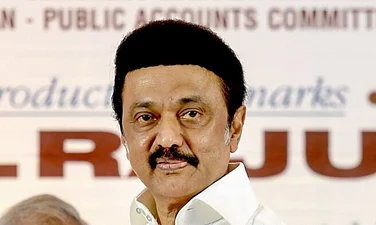“If you are an investment banker and don’t figure on the list of invitees, you might as well curl up and die,” said a report in Business Standard in February this year, referring to a summit in New Delhi attended by 250 key financial market players from 35 countries. It was hosted by a little-known ‘independent think-tank’ called the India Foundation barely two months before the general election. The highlight of the meeting: an address by the BJP’s prime ministerial candidate Narendra Modi.
The barely eight-year-old foundation, described as the hottest think-tank in Delhi, functions from a third-floor flat in an inconspicuous residential apartment complex on the tree-lined and surprisingly serene Hailey Road, a stone’s throw from the bustling Connaught Place and Kasturba Gandhi Marg. The bungalow next door was said to have been bought by Tata Housing two years ago for Rs 218 crore. Upscale address notwithstanding, there’s not even a signboard to announce the existence of the think-tank.
Although it likes to describe itself as independent, the India Foundation has to its credit made no attempt to gloss over its close relations with the party in government. One of the directors, Vinay Sahasrabuddhe, is a national vice-president of the BJP and known to be close to Prime Minister Narendra Modi. His book, Beyond A Billion Ballots, was released by Modi in June last year. Another director of the foundation, Ram Madhav Varanasi (that is how he is named on the foundation website), an RSS spokesman for over 10 years, joined the BJP as a general secretary and is entrusted with coordinating between the government and the party. Widely believed to be the third most important leader in the ruling party, Madhav is also the ‘international face’ of the RSS and the BJP.
Just how hot the India Foundation is became even more evident last Sunday when Modi inducted two more of its directors, Suresh Prabhu and Jayant Sinha, as the railway minister and the minister of state for finance respectively. One more director, journalist A. Surya Prakash, was appointed chairman of public service broadcaster Prasar Bharati late last month, while Nirmala Sitharaman, also a director of the foundation, was made MoS (commerce & industry) in May. She, however, left the foundation’s board of directors after joining the ministry amidst speculation that it could have been an office of profit.
Over the last decade or so, several think-tanks identified with the BJP-RSS mode of thought have emerged. The India Foundation is just one such. The list includes the Friends of BJP, the Centre for Accountable Governance, the India Policy Foundation, the Arthakranti Pratishthan, Niti Central, the Public Policy Research Centre and so on. In fact, these right-wing think-tanks have now been jocularly dubbed RINGOs.
The interlinks run at many levels. One would be hard pressed to find an example of a father and son heading two think-tanks in the same city and both lending weight to the ruling party—but India Foundation is headed by Shaurya Doval, and the equally powerful Vivekananda International Foundation (VIF) was headed by Ajit Kumar Doval, former IB chief, before he was appointed National Security Advisor (NSA). Modi made this appointment immediately on becoming PM, even before forming his cabinet. Nripendra Mishra, who joined the PMO as a principal secretary, too had been associated with the VIF.
While the VIF concerned itself with national security and strategic affairs, the India Foundation, packed with accountants, bankers and mediapersons, has been pushing a new economic agenda for the Modi government. It is quite telling that the RINGO’s key members now occupy top economic ministries. Many of the PM’s pet projects—smart cities, bullet trains, skill development and banking reforms, for example—were articulated first by the foundation (see graphic).

That’s impressive for a RINGO that has actually perked up only this year. According to its website, it has published only 18 papers in eight years. Its Twitter handle—@indiafoundation—is not updated often. Its most recent seminar, in late October, was on the “integral humanism” of Deen Dayal Upadhayaya. The India Foundation lists seven scholars on its website, two of whom are journalists Kanchan Gupta and Ashok Malik.
But all that’s small change compared to its big contributions to the NDA government. Jayant Sinha, the new MoS (finance), once headed the Omidyar Network, the philanthropic arm of eBay in India, and pushed for FDI in e-commerce. His wife Punita Kumar Sinha, a fellow IITian, worked for the Blackstone Group, which is a stakeholder in a large number of industries, including in Vedanta, Posco and Jindal, Monsanto and Google. She also served on the board of JSW Steel. Till recently, Blackstone India was headed by Akhil K. Gupta, a personal friend of Mukesh Ambani and former CEO, corporate development, at Reliance Industries.
The Omidyar Network funded ngos in India to launch and sustain anti-corruption campaigns, one of them being Bangalore-based Janaagraha, which spearheaded a campaign to privatise water supply in the city and was funded to run the ‘I Paid a Bribe’ website. The NGO was co-founded by Ramesh Ramanathan, former head of derivatives with Citibank in Europe, and his wife. Since then, Ramanathan has launched Janalakshmi, a microfinance institution (MFI) targeting the urban poor. The MFI’s turnover rose from Rs 20 crore in 2009 to Rs 450 crore in 2013 and it is now in the running for a bank licence.
The Omidyar Network is also said to have funded a 2012 study on ‘Why India Needs Aadhaar’. Executed by researchers from the University of California, it made out a case for the then controversial Unique Identification Number project. After Modi’s endorsement, Aadhaar is being linked to not just transfer of benefits to the poor but also to various government services, including issue of passports. Shaurya Doval heads the management team in India of a firm, Zeus Caps, which has a Saudi prince, Mishaal bin Abdullah bin Turki bin Abdulaziz Al-Saud, as its chairman. Zeus Caps, which describes itself as an investment platform for infrastructure projects, was conferred the Udyog Ratan Award by the Institute of Economic Studies, a think-tank and public policy group, in 2012. It had earlier conferred the same award on Vijay Mallya of Kingfisher Airlines as well.
The rise of both the VIF and the India Foundation reflect a paradigm shift in Indian politics, with the government depending less on bureaucrats and much more on private and ‘independent’ think- tanks for inputs to firm up policies and for creating a favourable environment. While the UPA was roundly criticised by the BJP for depending on an “extra-constitutional” National Advisory Council (NAC), the new government appears to have been no less ‘guilty’ in allowing the two ‘independent’ think-tanks (and not just the RSS) to do the backroom thinking on economy and security-related issues.
Surya Prakash explains the RINGO phenomenon. “Intellectual infrastructure in Delhi has been Nehruvian and Marxist. Therefore, there was room for other points of view,” he says. Asked why the Reliance-run Observer Research Foundation (ORF) hadn’t had similar impact on policy, Prakash told Outlook: “The VIF benfited from the very good choice of its first director—Mr Doval.”
The rise of RINGOs and their success in managing “democracy, philanthropy and dissent” have been watched with envy and dismay. Left-wing economist and activist Prasenjit Bose, formerly of the CPI(M), laments the failure of the Left to build up similar institutions. The EMS Academy, set up by the CPI(M) in Kerala after the death of E.M.S. Namboodiripad, is used only to hold classes for cadres, he points out. And the Left Front did not succeed in building up a think-tank in West Bengal despite being in power for 34 years. It is only now that they are out of power in the state that the CPI(M) is planning to set up an institute named after Jyoti Basu.
An obvious advantage the think-tanks have is the ease with which they can distance themselves from politics. This allows for greater acceptability and enables governments and corporate bodies to finance their activities. Next month, it will be the turn of the government of Goa to collaborate with the India Foundation for a two-day ‘India Ideas Conclave’ to discuss the role of politics and business in development. Not surprisingly, Sri Sri Ravi Shankar, the god of good times, will deliver the keynote address.
Working Groups
Ideas Accepted
- Ensure minimum government, maximum governance; unleash capabilities of the young; empowerment not entitlement
- Expedite Posco Steel, UMPPs, Mumbai Metro, Delhi-Mumbai industrial corridor
- 100 new cities (50 industrial townships, 20 tourism circuits, 20 knowledge cities and 10 media cities) to create construction and infrastructure jobs
- Defence sector should be ‘dramatically opened up’ to the private sector
- National Population Register, Census and electoral rolls to be linked with Aadhaar
- Bullet trains between top metros
Ideas on the boil
- Student loans for all between 18 and 25
- Nationwide tests in grades 3, 5, 8 and 10
- Regulators to be funded by industry fees
- Slums to give way to better living spaces
(Source: Paper by Jayant Sinha and Shaurya Doval in April 2014, published in India Foundation Journal in May)
***


























